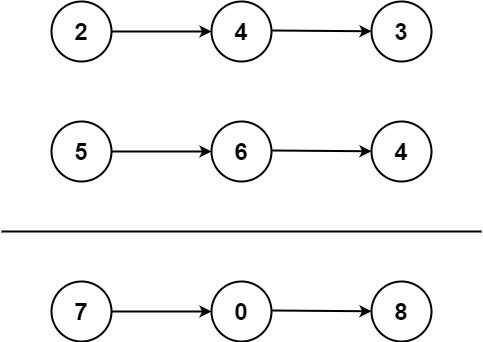
Introduction of this challenge:
I recently decided to improve my programming skills, so I started using LeetCode to achieve this goal.
However, since I don't have much programming experience and this is my first time using LeetCode, there may be some difficulties in the process, but I believe I will be able to persevere.
There are currently 2230 problems on LeetCode, and I will be working on the challenge by problem number with the goal of solving all of them.
After a week from the first problem, I finally finished problem 2. I think the biggest difficulty in solving this problem was that I was not familiar with the use of recursion, so I spent a lot of time at first to understand how it works.
After a long time of research, I finally came up with a solution to this problem, although not yet very skilled, but a great sense of accomplishment.
Let's start today's problem!
Today's problem is "2. Add Two Numbers".
Difficulty: Medium
Related Topics: Linked List Math RecursionLink: https://leetcode.com/problems/add-two-numbers/
Problem:
ex1
You are given two non-empty linked lists representing two non-negative integers. The digits are stored in reverse order, and each of their nodes contains a single digit. Add the two numbers and return the sum as a linked list.
You may assume the two numbers do not contain any leading zero, except the number 0 itself.
Example 1:

Input: l1 = [2,4,3], l2 = [5,6,4]
Output: [7,0,8]
Explanation: 342 + 465 = 807.Example 2:
Input: l1 = [0], l2 = [0]
Output: [0]Example 3:
Input: l1 = [9,9,9,9,9,9,9], l2 = [9,9,9,9]
Output: [8,9,9,9,0,0,0,1]Constraints:
- The number of nodes in each linked list is in the range [1, 100].
- 0 <= Node.val <= 9
- It is guaranteed that the list represents a number that does not have leading zeros.
My solution:
# Definition for singly-linked list.
# class ListNode:
# def __init__(self, val=0, next=None):
# self.val = val
# self.next = next
class Solution:
def addTwoNumbers(self, l1: Optional[ListNode], l2: Optional[ListNode]) -> Optional[ListNode]:
l3=ListNode()
if l1 != None and l2 != None: # Determine if l1,l2 is none
l3.val=l1.val+l2.val # Add to l3
if l3.val>=10: # Checking for carry
l3.val-=10
if l1.next != None: l1.next.val+=1
elif l2.next != None: l2.next.val+=1
else: l1.next=ListNode(1)
l3.next=self.addTwoNumbers(l1.next,l2.next) # recursion
elif l1 != None: # Determine if only l2 is none
l3.val=l1.val
if l3.val>=10:
l3.val-=10
if l1.next != None: l1.next.val+=1
else: l1.next=ListNode(1)
l3.next=self.addTwoNumbers(l1.next,None) # recursion
elif l2 != None: # Determine if only l1 is none
l3.val=l2.val
if l3.val>=10:
l3.val-=10
if l2.next != None: l2.next.val+=1
else: l2.next=ListNode(1)
l3.next=self.addTwoNumbers(None,l2.next) # recursion
else:
return
return l3
After coding, I submitted my solution.

Of course I'm still a long way from the best solution, so I'll try to find a better one.
This is the end of the leetcode challenge.
Feel free to give some suggestions based on my code, whether it's a way to improve performance or shorten the code.
Thanks for stopping by here and reading my post.